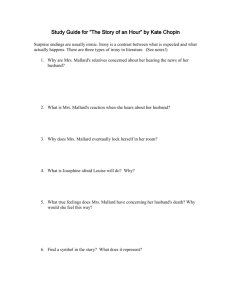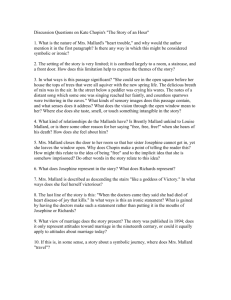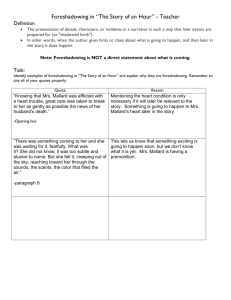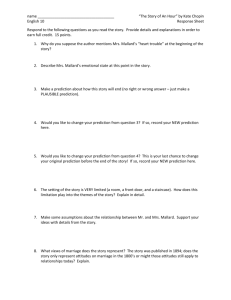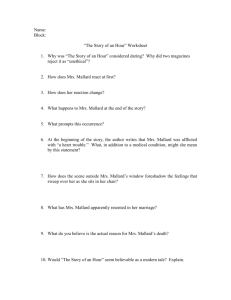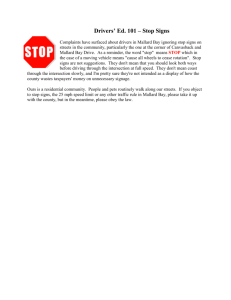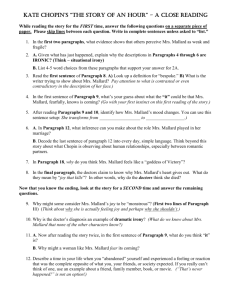Responding to Literature - Colorado Mesa University
advertisement
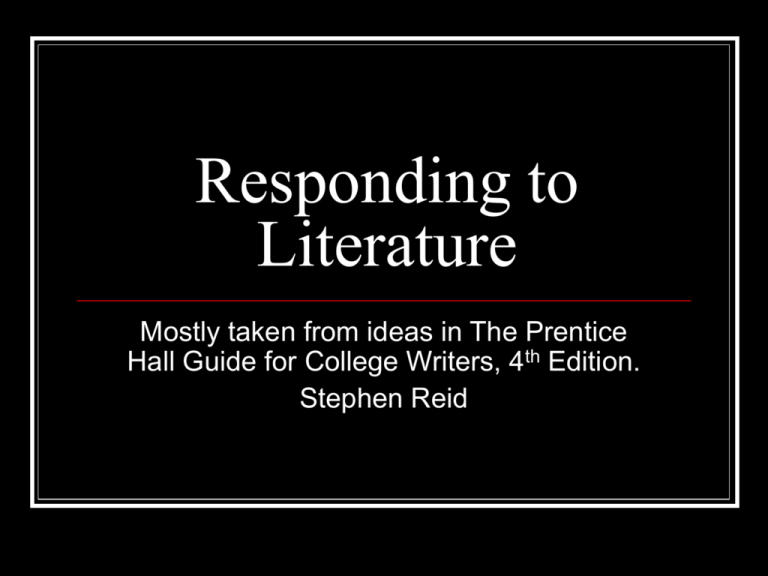
Responding to Literature Mostly taken from ideas in The Prentice Hall Guide for College Writers, 4th Edition. Stephen Reid What does it mean to “respond” to literature? The purpose of literature is to encourage you to reflect on your life and on the lives of others – to look for new ways of seeing and understanding the world – and ultimately to expand the world. This means that you have to put yourself into your response. It doesn’t mean that you can say anything you want. Your assertions must find support in the text. Your essay is persuasive – therefore, it must consider readers’ responses and values. The Story of an Hour http://www.vcu.edu/engweb/webtexts/hour/ Here’s a question the text makes me ask: What was so horrible about Mrs. Mallard’s marriage? How was it different from any other marriage of the time? What’s the question? Write out the question that The Tempest seems to ask. What’s your answer to that question? What do you think Shakespeare’s answer might have been? Some Options for Formalizing Your Response Explaining: As a responder, you could have the purpose of explaining what, why and how. What is the key subject? What is the most important character or event? What motivates a character? How does the character’s world build or unravel? How does a story meet or fail to meet our expectations? How did our interpretations develop? Explaining Relationships (an option for explaining) How do the parts of a story relate to the whole? How do plot or character conflicts affect your understanding of a major character? How does setting affect theme? How do images reveal character and/or contribute to theme? Another option: Evaluating Evaluating: How do you appreciate or establish the value of a piece of literature? Do you want to praise the work’s literary virtues? Do you want to find faults and weaknesses? Do you want to balance a discussion of both? What are the standards you use to assess value? How does this text meet those standards? What kinds of readers would appreciate this text? Why? How might other readers be turned off? Why is a work exciting, boring, dramatic, puzzling, vivid, relevant, memorable? For example . . . You might wish to set up criteria for an effective play and then provide evidence that shows that how this particular play does or doesn’t measure up. Your thesis might be The Tempest is highly dramatic because the main character undergoes emotional changes, the character conflicts heighten the tension, and the theme is controversial. Or, you might define the term “hero” or “heroine” and then analyze how the main character fits your definition. Or, you could . . . Problem Solve: Describe how you overcame obstacles in understanding the story. Describe how the author solved problems in writing key scenes, creating characters, setting a plot in motion, creating and resolving conflicts. If you’re a writer yourself, you could discuss how successfully the writer met the challenge of presenting an idea or creating a viable character or provoking action. What happened was . . . Often a reader’s interpretation will change during the course of responding to a piece of literature. Your thesis statement might be “Originally, I thought the theme of The Tempest was ________, but now I realize that the theme is __________. And finally, You can argue with or against some other point of view. Is Shakespeare writing a critique of colonialism in this play? Is the play misogynistic? Is the main character selfish or selfless? Is the setting appropriate to the theme? How does the work compare in terms of quality with some other work? What did you say? During class, you might find that you disagree with someone else’s statement about the play. Your thesis, in this case might be, “Although some readers believe that The Tempest is about _________, it is really about ___________. You might organize your essay by stating the opposing interpretation and examining the evidence that supports it, and then stating your interpretation and showing how other evidence makes your case: description, dialogue, images, points of view, events. Tone/Objectivity: While it looks like I’m saying that you can respond in any way you like, I want to make it clear that you must keep your tone measured. While it is necessary to take a stand, you can never forget that you’re writing to convince, to persuade, to bring your reader with you. You must consider her position and her possible objections to your argument. Reading to Respond . . . Summarize the text in your own words. Write down your observations or reactions as you read. Note surprising passages. Ask yourself questions about ambiguous or confusing passages. Try this: Read Chopin. Here are five summarizing statements about “The Story of an Hour.” Mrs. Mallard is initially paralyzed by the news. Mrs. Mallard feels her sister will protect her. She weeps in her sister’s arms. From the security of her chair, she stares at life outside her window. Mrs. Mallard is young, but the lines on her face reveal repression. Mrs. Mallard now feels “free, free, free” of the bonds of marriage. News of her husband’s death doesn’t kill her, but news of his life does. Write down five summarizing statements about The Tempest. And this: Here are four observations about “The Story of an Hour.” Mrs. Mallard has “heart trouble” – possible double meaning. Although Mrs. Mallard is experiencing shock and grief, outside her window the world is full of life. Joy that kills equals monstrous joy. She does not die of joy that kills – she dies of killed joy. Write down four or five observations about The Tempest. And This . . . Here are four or five questions about “The Story of an Hour.” Why does the “storm” of grief come so quickly and then disappear? She would live for herself: Is this selfishness or just a desire to be free? Why does Chopin make Mrs. Mallard seem powerless, as though she was overcome by fever? Should we admire her for wanting her freedom? Is this the story of an hour or the story of her life? Write down four or five questions about The Tempest. Quoting Prose ..\..\..\My Documents\112\Fall 00\lectures.doc p. 19 Give it a try. Imitate the shorter version. Imitate the longer one. Avoid free standing quotations. Introduce the quote with a signal phrase. Follow the quote with some context or reason for including it. Remember to use ellipses when deleting words. Use brackets when adding words. So now what? Let’s try responding to a very short piece of writing: Pick a piece from In Short. Go back to Summary, Observation, Questions Write a response using one of the suggestions: argue, problem solve, evaluate, explain. Share
